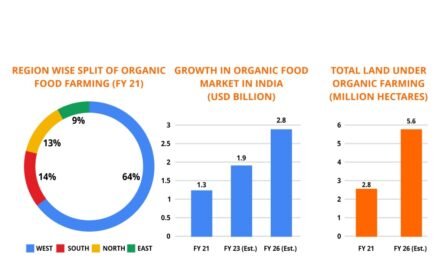The Government of India is actively encouraging sustainable agricultural practices through a series of progressive policies and initiatives aimed at enhancing farm productivity while preserving the environment. With the increasing need to address challenges such as climate change, soil degradation, water scarcity, and biodiversity loss, these policies are fostering a transition toward eco-friendly, resource-efficient, and climate-resilient farming methods, ensuring long-term sustainability and food security.
One of the flagship initiatives promoting sustainability is the Paramparagat Krishi Vikas Yojana (PKVY), which supports organic farming by encouraging farmers to adopt chemical-free cultivation techniques. Under this scheme, financial assistance is provided for organic inputs, certification, and marketing, helping farmers transition to sustainable practices and meet the growing demand for organic produce. Similarly, the National Mission for Sustainable Agriculture (NMSA) focuses on enhancing resource efficiency through programs like rainwater harvesting, soil health management, and micro-irrigation systems.
The government has also launched the Soil Health Card Scheme, aimed at promoting balanced use of fertilizers and improving soil health. By providing farmers with detailed information about the nutrient content of their soil, this program encourages the judicious use of fertilizers, reducing chemical overuse and preventing soil degradation.
To address water scarcity, policies like the Pradhan Mantri Krishi Sinchayee Yojana (PMKSY) are promoting water-use efficiency through the adoption of micro-irrigation technologies such as drip and sprinkler systems. These methods ensure optimal use of water resources while boosting crop yields, particularly in drought-prone regions. Additionally, the government is incentivizing the cultivation of drought-resistant and climate-resilient crops to reduce dependency on water-intensive farming.
The promotion of zero-budget natural farming (ZBNF) is another significant policy direction, encouraging the use of locally sourced natural inputs like cow dung, cow urine, and plant-based fertilizers. ZBNF reduces input costs and enhances soil fertility, providing small and marginal farmers with a sustainable and affordable farming model.
Government programs are also supporting the adoption of technology-driven solutions for sustainable agriculture. Initiatives like the National e-Governance Plan in Agriculture (NeGPA) and schemes promoting precision agriculture tools help farmers optimize resources through real-time data on weather, crop health, and soil conditions. Technologies such as IoT-based sensors, AI analytics, and drones are being incentivized to reduce resource wastage and improve efficiency.
Furthermore, policies under the National Agroforestry Policy are encouraging farmers to integrate trees with crops and livestock systems, enhancing biodiversity, improving carbon sequestration, and ensuring an additional source of income for farmers. Initiatives to reduce stubble burning, such as subsidizing equipment like Happy Seeders and Super Straw Management Systems, are being implemented to tackle air pollution and promote soil health.
By aligning these policies with global climate goals and the vision of sustainable development, the government is empowering farmers to adopt eco-friendly practices while enhancing productivity, profitability, and resilience. These efforts not only safeguard natural resources but also pave the way for a climate-resilient and sustainable agricultural ecosystem, ensuring food security and economic stability for future generations.









